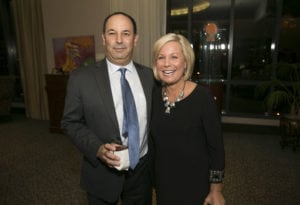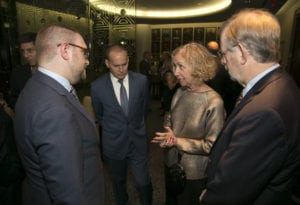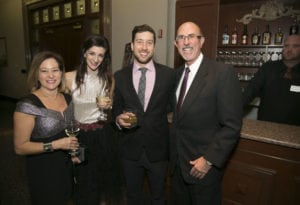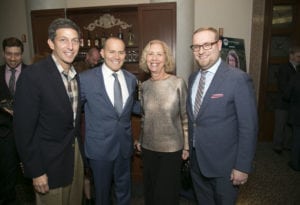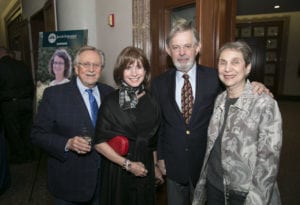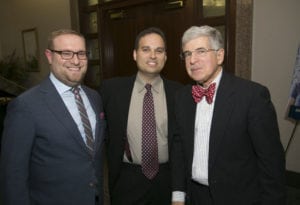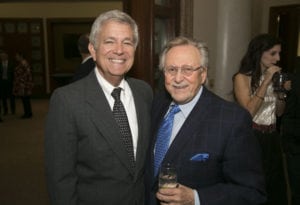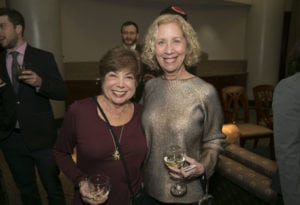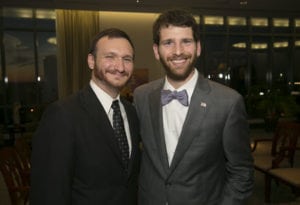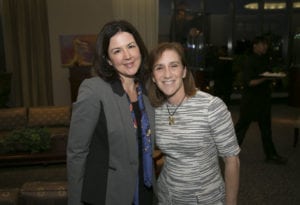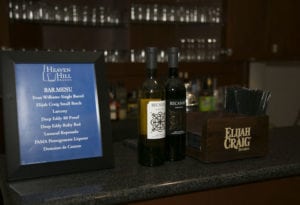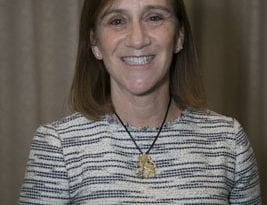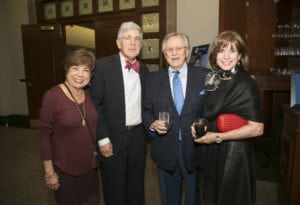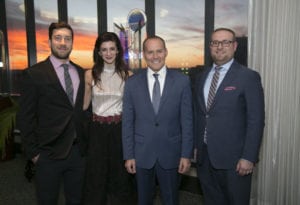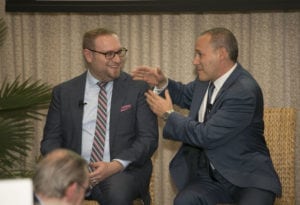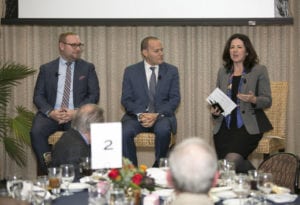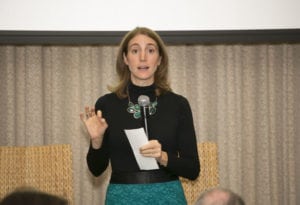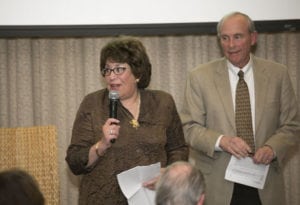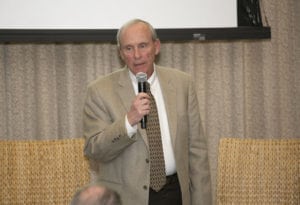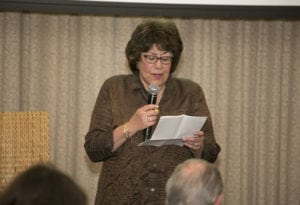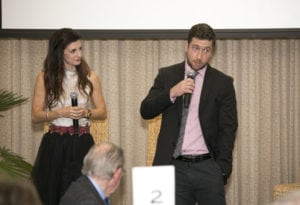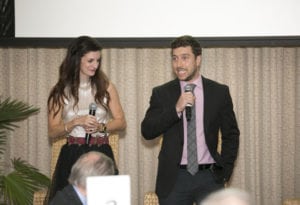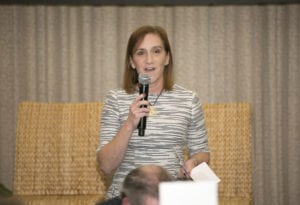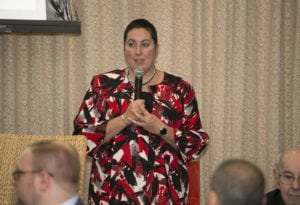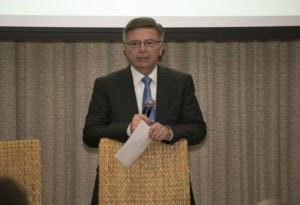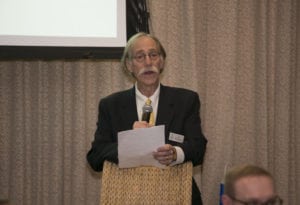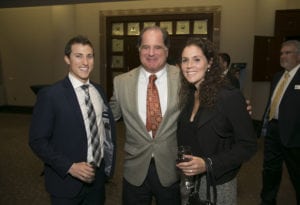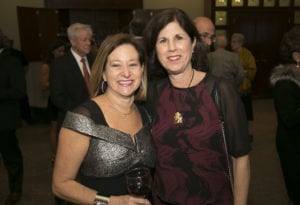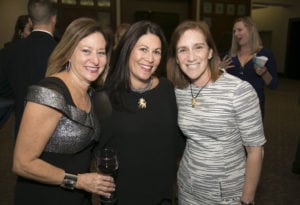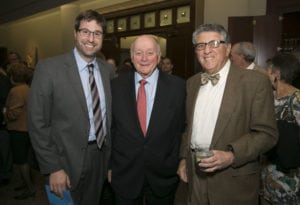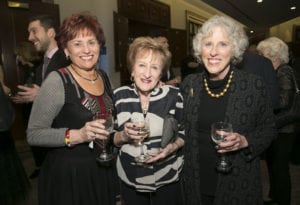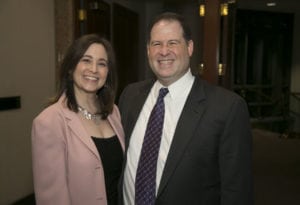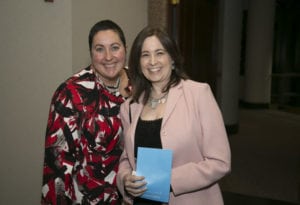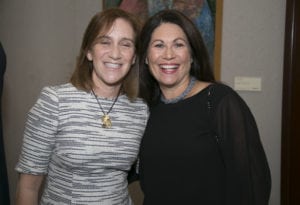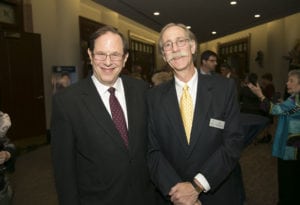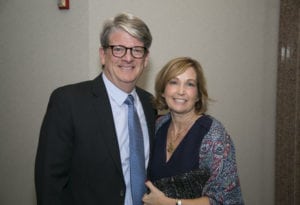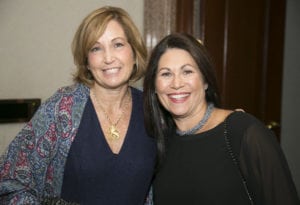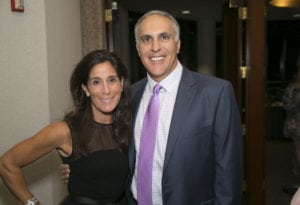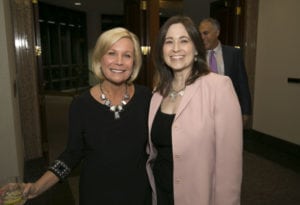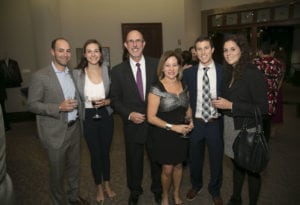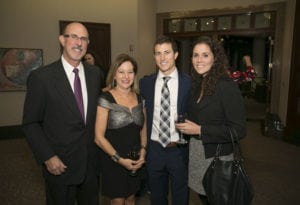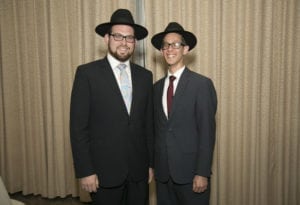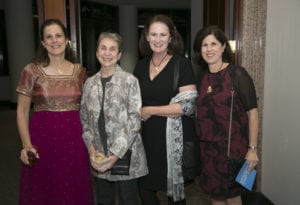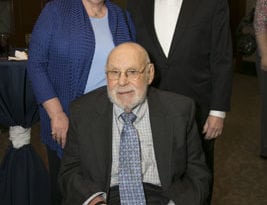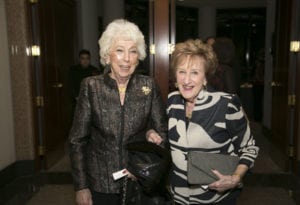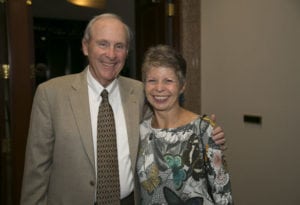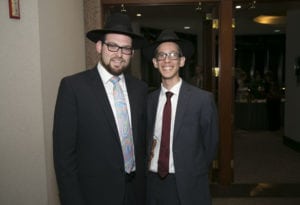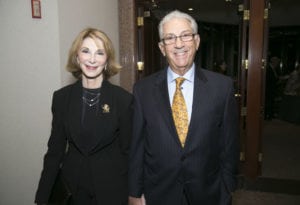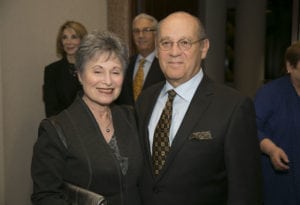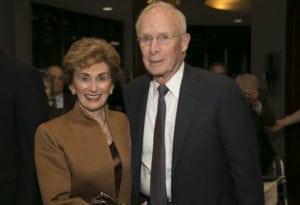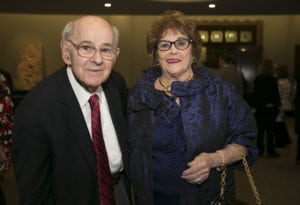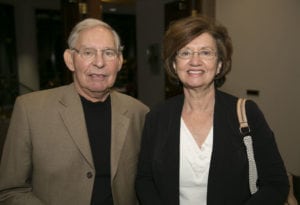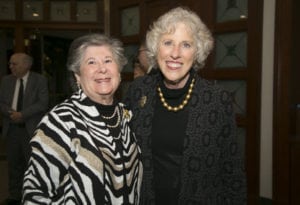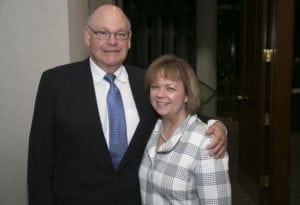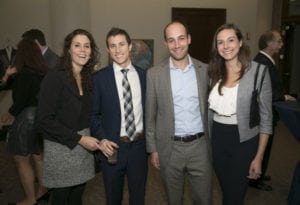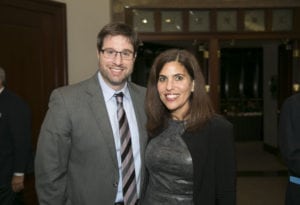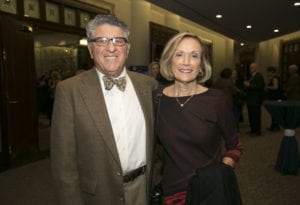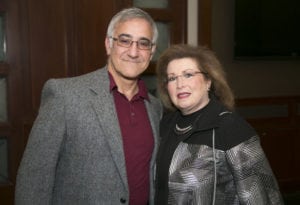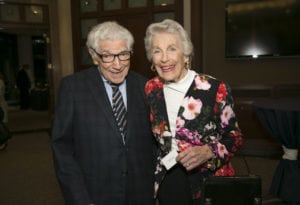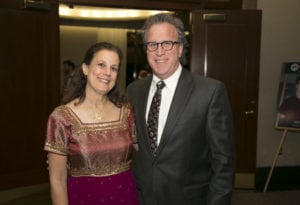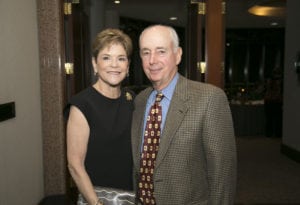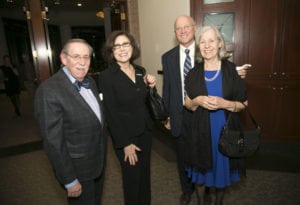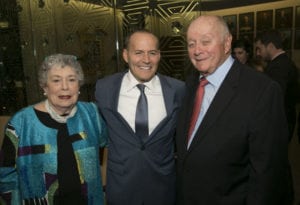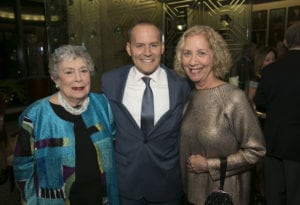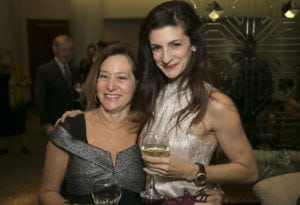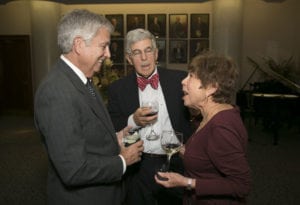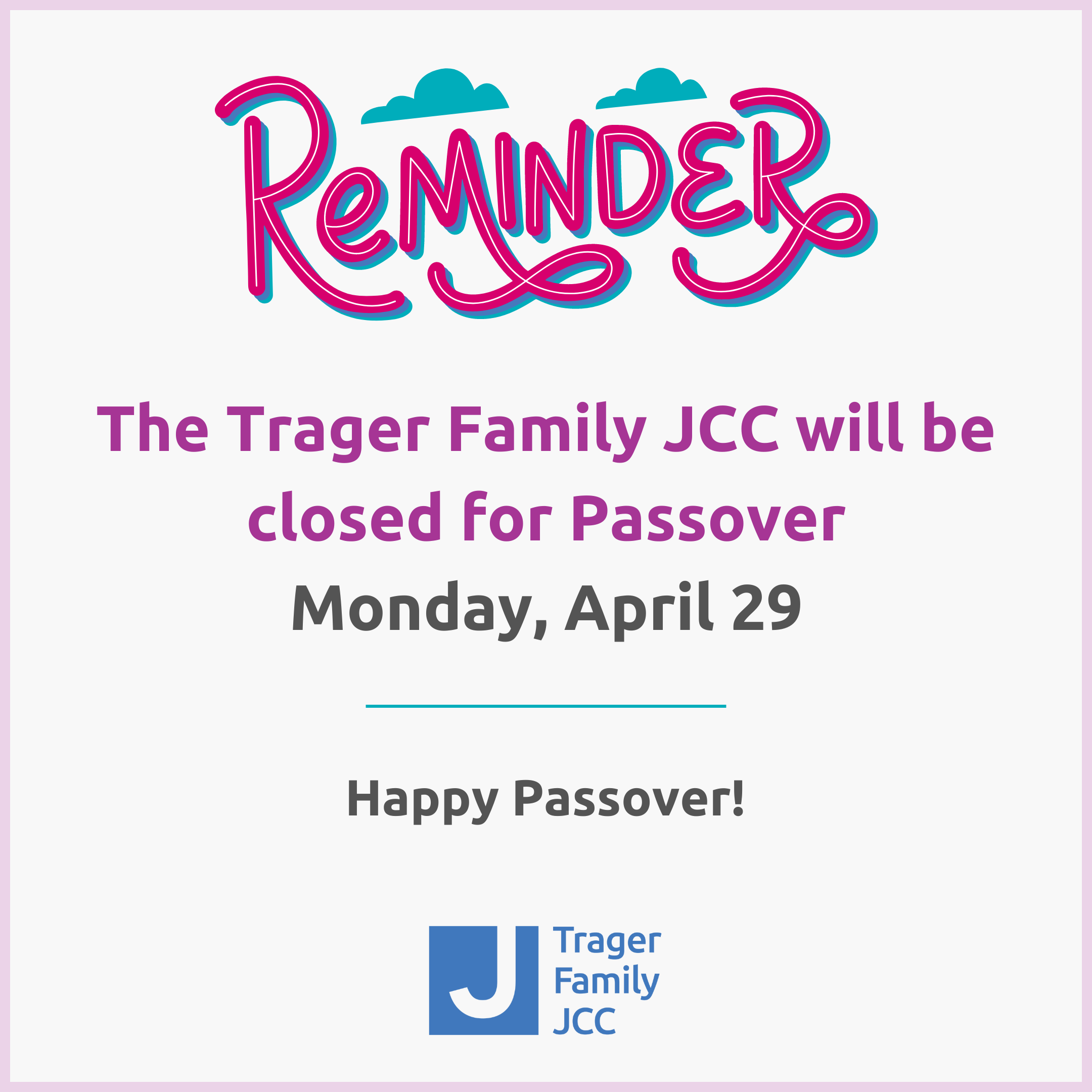Donors who attended the 2017 Federation Campaign Major Gifts Dinner on Sunday, November 6, came away with a message of progress, change and hope, and they responded by increasing their gifts five percent over what they gave last year.
Jewish Community of Louisville President and CEO Sara Klein Wagner set the tone for the evening by announcing a significant grant, briefing the group on JTomorrow and sharing highlights of a year of accomplishment for the organization.
The Jewish Heritage Fund for Excellence is continuing to invest in Louisville’s Jewish community and to encourage community members to participate in the Annual Campaign. For a second consecutive year, JHFE is sponsoring the Double Your Impact Challenge. The organization will match all new gifts and all increases in gifts over the prior year up to $200,000. “We’re incredibly fortunate to have that opportunity again this year,” Wagner said.
Two young adults, Greg Sokoler and Casey Tuma, shared their personal story of how Birthright Israel, a program supported by funds raised by the Campaign, connected them with each other and with Judaism to transform their lives.
Campaign Co-Chairs Jane Goldstein and Jon Fleischaker shared some of their reasons for leading the 2017 Federation Campaign and encouraged everyone present to make their commitments.
The evening also included pre-election political insights from pundits Jeff Berkowitz and Jay Footlik.
JTomorrow
“We are looking at what’s aspirationally possible with a vision of how we’re going to bring the community together,” Wagner began as she described JTomorrow. “The building we have loved at 3600 Dutchmans Ln., which we all have emotional attachment to and have wonderful memories of – as Stacy likes to say, our iconic building – we know that unfortunately it is not the building for the future for us,” she continued. “It is not financially responsible to renovate our current building.”
For the immediate future, she stressed, the organization can “continue to live in the building” and “offer the great programs we’re offering, but we know we really need to look at a new building.” She called on those present to become the pioneers for future generations.
With Jeff Goldberg to lead the visioning team that is now being recruited, Wagner said, JTomorrow will start with the studies and committee work that has been done over the years and move forward. Chris Bingaman, “an expert in putting projects like this together,” she explained, has been hired to move the project forward and a communications plan is being developed.
Where will the building be? “With the info we have to date and potential partners that would like to work with us, we are looking at our property on Dutchmans Lane,” Wagner said, “but we have not made that a final decision.”
How big will it be? “The size of the building and what’s included in it will be dependent on what the community will support,” she stated. The vision that is developed will take into account what the JTomorrow team wants The J to be and what successful JCCs look like. It will take into account sustainability and the needs for tomorrow.
In addition to the need for a new building and the steps to be taken to ensure the right decisions will be made as plans are developed and that there will be open communication throughout the process, Wagner spoke about the importance of building community. “People are craving community,” she said, “Everyone wants to be a part of a community, and it’s our job to help them find their place in ours.”
To accomplish this and to be relevant, Wagner says the agency will use collaboration and leadership development, opening the doors to invite people in. “We know that we have to invest in our participants but we need our participants to also participate and invest in us,” she said. “We don’t want to just fill the seats and not have people have a say or have a stake in what they’re coming to.”
Opening new pathways for people to become involved in the community is critical. “Each one of us in this room might have had our entry point. The entry point for our children and grandchildren will be much different,” she added.
Birthright Leads to Involvement and Love
Birthright Israel, the program that gives Jewish young adults the opportunity to experience Israel on a peer trip, can be a life changing experience, and for Greg Sokoler and Casey Tuma, it certainly was.
Tuma took her Birthright trip in 2008. At the time, she was a recent graduate of Penn State, living in New York and working as an actor. The trip, which she made with other young people involved in the arts, put her “on my spiritual journey with Judaism,” she said, and the experience stayed with her.
Five years later she proposed creating another Birthright Israel arts trip. The program leaders agreed and gave her two weeks to recruit 40 people to fill a bus. She succeeded. The program, which she staffs, is now in its 10th season and has become self-recruiting.
Sokoler and two of his friends, all of whom were approaching 26, the cut of age for Birthright participation, signed up for her trip and, despite security concerns as Israel engaged in conflict with Gaza, went to Israel for the trip. Stating that his parents weren’t involved in the Jewish community, Sokoler said, “I was the one in my family who was trying to find out where my place was in Judaism.”
The connection between the Sokoler and Tuma began on a two-hour Shabbat walk to the hotel from the Kotel (the Western Wall). By day seven, Tuma said, “we were in Tsfat, which is my favorite city in all of Israel. Greg was across the way looking in some shop and I said to one of my mentors, … I’m going to marry him.”
Back in this country, Tuma decided to come visit Sokoler for a month. One month stretched into three, “then that turned into I think I’m going to come and stay forever because I can’t be apart from him,” she said.
He joined her in leading Birthright trips and they got engaged on the beach in Tel Aviv. They are planning to get married in June, but before they go on their honeymoon, they’re going to staff another Birthright Israel trip.
Sokoler thanked those present for supporting the Birthright Israel program. Without the experiences it provided, he would not have seen the importance of marrying a Jew or of being active in the Jewish community. “Thank you for the opportunity to be here,” he said and to help you “understand the impact that you have made here on a small scale,” and know that “it reverberates around the world.”
Why the Federation Campaign
Reemphasizing the impact of the Birthright Israel Program and the vision for JTomorrow Wagner had put forth, Jane Goldstein asked Jon Fleischaker to share his reasons for co-chairing the 2017 Campaign.
Fleischaker, a Louisville native whose mother “was extremely active with Jewish Hospital and other Jewish organizations,” explained, that he spent a lot of time at The J and at Standard Country Club, when it was Jewish, because “we had no other options. Where if you were Jewish, you had to create your own options because you weren’t allowed to be a part of the greater community.
“Times are better now,” he continued. “Our children and our grandchildren … have more options and, as Sara said, we have to change” to remain relevant and a part of their lives.
Fleischaker also believes, “it is extremely important for this Jewish community to be actively involved in the larger community. It is something we not only have to do to preserve ourselves but we have to do it to make larger community better place.”
A brief piece his son, Jeff Fleischaker, a lawyer in Allentown, PA, recently wrote speaks strongly to him about why we need a strong Jewish community, so he shared it.
“I was raised to be a proud Jewish man,” Fleischaker read. “I did not know or appreciate what that meant for a long time except that when I worked as a public defender in rural Kentucky I did not feel compelled to share my religious learnings with my clients.
“But I know now, as Jews, we are ever vigilant, something that is second nature where the history of persecution is long. It is not just about me or my fellow Jews. I am taught to be vigilant against persecution of any sort.
“Our faith and our history show us that persecution of one will no doubt lead to the persecution of all. So I was taught to stand up, be counted and be proud, don’t simply tolerate others. Respect them and appreciate them. Revere their rights as your own.
“Isn’t that what the progressive movement or in the old parlance, liberalism, or even older parlance, civil rights, is all about?
“So I stand. I stand because that is what I was taught and what I will teach my daughters today and next week.”
After sharing his son’s thoughts, Fleischaker added, “We are living in a time when not just anti-Semitism, but racism, intolerance are exploding all around us. It’s a part of the presidential campaign, one candidate in particular, and it is growing.
“It is something that we have to stand up against. Not just anti-Semitism – we have to stand up against any kind of intolerance, because that’s who we are. That’s how we make the world a better place [in which] to live. In order to do that, we need strong Jewish institutions; we need a strong Jewish Community of Louisville; we need a strong community relations effort.”
Fleischaker and Goldstein appealed to everyone present to stand up and help make this Campaign a success.
Guest Speakers
Becky Swansburg introduced the guest speakers, Jeff Berkowitz, who has a long history of working with leading Republicans and the Republican National Committee, and Jay Footlick, who has similar credentials with the Democrats. University of Louisville Political Science Professor Jasmine Farrier Frockt moderated their discussion.
Farrier defined politics as “a nonviolent coordination of conflict for self-government.” Then she guided the speakers to talk about their lives and advocacy and the ways they contribute to the Jewish community, support for Israel as a bipartisan issue, other potentially unifying issues and ways to overcome the divisiveness of the election.
While Footlik said the leaders of the Democratic party and solidly pro-Israel, he expressed concern about a growing divide within the party and the increasing strength of the BDS (Boycott, Divest and Sanction) movement.
Berkowitz said that both parties were solidly pro-Israel. “I’m delighted that there is tremendous bipartisanship and I can only hope that that is a springboard for healing the country after one of the most divisive elections in our history.”
The two did not agree on other issues that might bring unity to the country under either Hillary Clinton or Donald Trump, but both felt that there are many people on both sides of the aisle who are willing to work together and build stronger communities.



